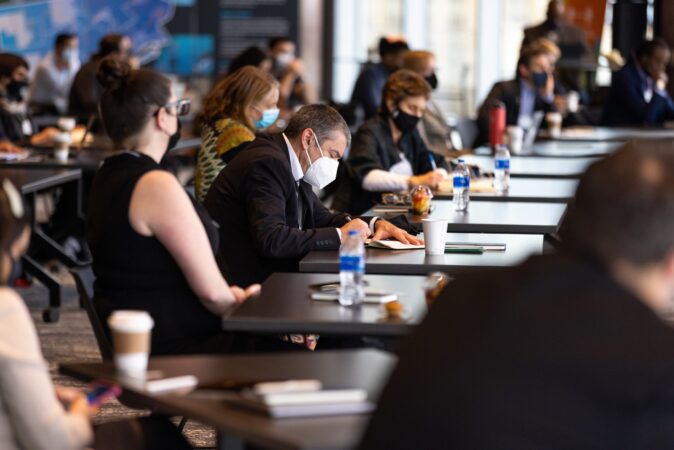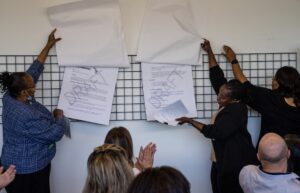The World Economic Forum’s Inaugural Urban Transformation Summit took place in Detroit this week as a global initiative toward advancing public-private collaboration to create more sustainable, inclusive cities.
The invitation-only event convened participants from business, government, and civil society from around the world for a series of virtual and in-person events.
Upon the opening of the event, protesters converged to rally against the World Economic Forum, with signs reading “Stop capitalist looting of Detroit.”
In light of that, Jeff Merritt, Head of Urban Transformation, World Economic Forum says “yes, we know there is skepticism around public /private collaboration, and certainly, there are cases in which this has gone badly. But if the issues are approached in the right way, the positive outcomes are enormous.”
Public-private partnerships were showcased throughout the summit as the facilitator of much of Detroit’s progress and as a possible solution for many of the issues it and other cities face.

WORLD ECONOMIC FORUM URBAN TRANSFORMATION SUMMIT
In advance of the Summit, Detroitisit sat down with Merritt to get his perspective on the launch of the Centre for Urban Transformation in Detroit, and the Summit itself.
Kim Kisner: What is the Goal for the Centre for Urban Transformation?
Jeff Merritt: First, to answer the ‘why’ behind the focus on urban transformation itself… we can’t look at global challenges without talking about cities. By 2030 the urban population is expected to be 5 billion, with 600 cities generating more than 60% of global gross domestic product. While cities drive growth and innovation, they are also the source of issues such as climate change, inequality, and more. Yet the solutions to these issues lie within the cities.
Second, the ‘why’ behind the Centre itself involves the need for on the ground action. It’s important for us to have a headquarters – something tangible that demonstrates specific terms versus broad strokes – to affect the work that needs to be done.
KK: Why Detroit?
JM: It boils down to these two main factors:
- Detroit has a strong narrative that represents cities around the world
Detroit has a fascinating history. It was once one of the wealthiest cities, a hub for innovation, culture, music, the arts. But as the world changed Detroit wasn’t able to transition and fell short.
Detroit’s experience is reflective of ups and downs and that gives us a canvas from which to learn.
The city is also unique in its diversity, which reflects how all cities will evolve to be future-forward. There are elements of inclusion, sustainability, and resiliency – the narrative is so strong here and that allows us to tell this story through a physical place.
- We need on the ground partners
The future of cities is collaboration. We need strong partners in the private sector who are working hand in hand with the public sector to make changes. That is happening in Detroit.
Bedrock is a terrific example. CEO Kori Bonner’s diverse background involving work in both the public and private sectors gives him a unique perspective and the work Bedrock is doing is indicative of what needs to be done.
Also, the bankruptcy of Detroit literally forced public and private sectors to work together.
So the collaboration that’s progressing in Detroit makes it a great testbed and example for cities around the world.
KK: What Can Detroiters Feel About the City Chosen for the Centre? Who Will be Impacted, and How?
JM: First, we’ll be able to shine a global spotlight on the city and some of the great work that’s being done that may not be getting exposure. The Forum is a massive megaphone and we have the ability to mobilize resources and elevate this exciting work.
The magic of the Forum is that it’s a connector and a catalyst, giving Detroit and other cities access to expertise from around the globe to address gaps and accelerate change.
One example is our Fellowship Program that we’ll be activating in Detroit. We choose thought leaders from companies, academic institutions, organizations, and these individuals essentially will take a sabbatical and join the Forum temporarily, connecting local efforts to international expertise on specific issues in a practical outcomes way that accelerates local efforts.
KK: What is the Importance of the Public/Private Sector Collaboration?
JM: As we work toward a more sustainable and equitable future, the government cannot carry this burden alone. We need an all hands on deck approach, involving businesses, philanthropic entities, academic institutions, etc. The challenges are simply too great to address alone.
City governments are being asked to do more and more and at the end of the day, their budgetary resources are based on taxes – they only have so much to give. It’s straight mathematics. With the growing number of issues, continuing quality of life improvements for cities takes collaboration.
KK: What Examples Show Private/Public collaboration Done Right?
JM: A terrific example is Detroit’s Strategic Neighborhood Fund. This is a perfect showcase of the alignment of resources and community pulling together in one direction and creating momentum so neighborhoods can see real change.
Another example is Michigan Central Station, a monumental effort that will result in immeasurable outcomes that will require multiple stakeholders and resources to work together.
KK: Next Steps From the Summit and the Centre?
JM: We are launching a year-long City Strategy Dialogs Program that’s modeled after national-level work that’s being done.
Cities will identify a specific issue or priority, and the Forum will assist in curating a group of leaders and experts to work together to find solutions. These Dialogs will begin to happen in Detroit, Denver and Miami in 2022.
That’s just one effort that will launch directly after the summit. I also talked about the Fellowship program as a second immediate initiative.
KK: End Goal for the Summit Itself?
JM: I see it breaking down in two ways.
First, an event provides a moment in time where you can make global announcements and draw attention to important work that’s happening. An annual event like this offers the opportunity to talk about private and public sector collaborations, showcase successes and draw global attention from which to springboard off and continue the momentum.
The World Economic Forum is known for DAVOS, (the annual convergence of high profile and political thought leaders in Switzerland) and many people think it’s a conference. In essence, it’s a convening of people from various sectors who – when brought together – start to form multiple collaborations and mobilize resources to effect change.
Takeaways from the Summit

OPENING SESSION – DEFINING A NEW ERA FOR CITIES
Mayor Mike Duggan opened the Summit, saying “There is so much that government can’t do by itself. We don’t need any more think tanks, we don’t need any more papers. We need public-private partnerships. We know what the barriers are that are holding our residents back.”
What surfaced repeatedly is the fact that whether it be India, Europe, New Jersey, or Austin Texas, we are all facing similar issues across the globe as we prepare for larger populations transitioning to urban living. Be it infrastructure issues, healthy urban living, inclusion and shared opportunity, environmental … the list goes on.
Wealth creation was a large focus of discussion during the summit, with Bedrock CEO Kofi Bonner saying “We have to fundamentally deal with the fact that we’re dealing with a capitalistic system and in that capitalistic system in order for people to thrive, they must grow wealth.”
Meanwhile, Carla Walker Miller, President of Walker/Miller commented,
How about we respect small businesses enough to listen to them to ask them what they need and to design an ecosystem that actually addresses their needs, with honor with respect and with dignity, for the benefit of the city of Detroit.
Another focal point was inclusivity, and regarding energy Miller said “we’ve talked about the digital divide … similarly, I think we are creating an energy divide. As we move toward solar we need to consider families that are under-resourced and don’t have the ability to align. We need to talk about energy and opportunity holistically and find solutions that work for all.”
Regarding action being taken in the right direction toward the issue of healthy living, New Jersey Mayor, Steven Fulop shared some multi-faceted partnerships and plans to enable and accelerate healthy living. The city has partnered with Aero Farms in a vertical farming effort of which there are now ten underway that will ultimately yield thousands of pounds of healthy greens for the people of the city. Running parallel are healthy eating seminars and training. They’ve implemented wearable tracking devices – and have partnered with IBM to track data. This data can then be leveraged as a “toolkit” of sorts for others to adopt and implement.
Across the board, many tough questions were raised, and congruently, many positive initiatives and solutions were shared. Merritt says “Impact won’t happen overnight, but the Summit helped to continue to shape the connective tissue that serves as the catalyst for change.”
As always, be sure to subscribe to our newsletter for regular updates on all things Detroit and more.






















